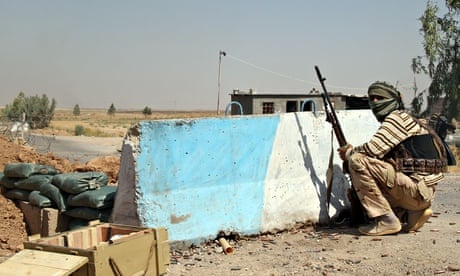The United Nations special representative for Iraq has called on the international community to take immediate action to avoid a massacre of civilians in town besieged by Islamic State (Isis) forces.
Nickolay Mladenov said he was "seriously alarmed" by reports that the people living in the northern Iraqi town of Amerli had no food or water as the two-month siege continues.
He said: "The situation of the people in Amerli is desperate and demands immediate action to prevent the possible massacre of its citizens. The town is besieged by [Isis] and reports confirm that people are surviving in desperate conditions."
Mladenov, a former Bulgarian foreign minister, also called on the Iraqi government to evacuate the town or provide "lifesaving humanitarian assistance" to those trapped there.
He added: "Iraq's allies and the international community should work with the authorities to prevent a human rights tragedy. The United Nations in Iraq will do all it can to support the government and people of Iraq in alleviating the unspeakable suffering of Amerli's inhabitants."
His comments came as western powers face mounting pressure to do more to confront Isis in its stronghold in Syria, as the heavily armed militants edged closer to taking an important airbase that would cement their domination over a swath of the country's north.
As US aircraft continued to pound the Islamist militants in northern Iraq, the Obama administration was studying a range of options for pressuring Isis in Syria, primarily through training "moderate" Syrian rebels as a proxy force, with air strikes as a possible backup.
Leaders in Washington and London are adamant they will not collaborate with the regime of Bashar al-Assad in tackling their common enemy, and on Friday the Pentagon insisted that it had yet to decide on whether to expand the US air war into Syria.
The White House has issued its strongest condemnation yet of the killing of American journalist James Foley, describing his beheading as an act of terrorism and warning that the US military response would not be restricted by international borders.
US deputy national security adviser Ben Rhodes said Foley's murder "represents a terrorist attack against our country" – a position backed by the UN security council, which called the killing "heinous and cowardly" in a unanimous statement.
"When we see somebody killed in such a horrific way, that represents a terrorist attack against our country and against an American citizen," said Rhodes, adding that the US would do whatever necessary to protect its citizens in future.
"We are actively considering what is necessary to deal with that threat and we are not going to be restricted by borders," said Rhodes, briefing reporters at Martha's Vineyard, where Barack Obama is on holiday.
Earlier on Saturday Iraq's parliamentary speaker said an investigation was underway into an attack on a mosque that killed around 70 people and threatened moves to form a new government in the country struggling to contain the advance of the extremist Isis.
Salim al-Jabouri said on Saturday that a committee of security officials and MPs would announce its findings in two days after an investigation into the attack on Friday at a Sunni mosque in Diyala province, in eastern Iraq.
Doctors and police officers said 20 people were also wounded when worshippers were attacked with machine guns at the Musab bin Omair mosque, which Jabouri, a Sunni, described as "carnage".
Initial reports suggested Shia militiamen carried out the attack in revenge for the deaths of their fellow fighters, raising the threat of a further escalation of sectarian tensions. Ibrahim Aziz Ali, whose 25-year-old nephew was among those killed, told Agence France-Presse that he and other residents heard gunfire and rushed to the mosque, where they were fired on by snipers.
Five vehicles with images of Imam Hussein, one of the most revered figures in Shia Islam, were parked at the mosque, Ali said.
When they could finally enter, "we found a massacre," he said.
Police officers said that angry residents exchanged fire with security forces and militiamen in the area on Friday, but reported no casualties. Iraqi premier-designate Haider al-Abadi issued a statement calling for unity and condemning the killings.
Two major Sunni blocs, including Jabouri's, have suspended talks on forming a new Shia-led government until the investigation is concluded. But other reports have said Isis, a Sunni militant group, was responsible.
Jabouri did not comment on the political fallout of the incident but it comes as the US vice-president, Joe Biden, made it clear that the White House would back a federalist government in Iraq, a further acknowledgement that there are growing doubts as to whether the unity of the country can be maintained.
Writing in the Washington Post, Biden – who is a longtime advocate of a plan under which Iraq would be divided into three autonomous regions for Shias, Sunnis and Kurds – also said the US was prepared to "further enhance" its support for Iraq's fight against Isis.
